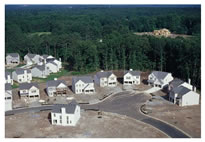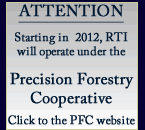|
Project Info | Statistics Tables | Maps | Acknowledgements
|
 The 2007 Washington State Legislature directed the University of Washington College of Forest
Resources and its Northwest Environmental Forum to produce recommendations “for retaining the
highest valued working forest lands at risk of conversion to non-forest uses.” Since 2004, Forum dialogues have
brought together over 400 participants from 94 organizations, representing the full range of interests
concerned about the future of Washington’s forests. Informed by in-depth research from the
College, a remarkable consensus about the nature of the threats and the steps that must be taken to
conserve our state’s working forests has emerged. The 2007 Washington State Legislature directed the University of Washington College of Forest
Resources and its Northwest Environmental Forum to produce recommendations “for retaining the
highest valued working forest lands at risk of conversion to non-forest uses.” Since 2004, Forum dialogues have
brought together over 400 participants from 94 organizations, representing the full range of interests
concerned about the future of Washington’s forests. Informed by in-depth research from the
College, a remarkable consensus about the nature of the threats and the steps that must be taken to
conserve our state’s working forests has emerged.
The 2008 Forum defined “working forests” as “sustainably managed for commodity products as
well as ecological and social values” and requiring a “permanent and un-fragmented land base.”
The Forum made a series of major recommendations for the 2009 Legislature.
- Fund the maintenance and enhancement of the Land Parcel Database.
- Establish right to practice forestry legislation.
- Support Washington Farm Forestry Association and Washington State Department of
Natural Resources (DNR) requests to fully fund the Family Forest Fish Passage Program
(FFFPP) and Forestry Riparian Easement Program (FREP) programs, for DNR requests for
expert forestry assistance for small landowners, and for landowner incentives to provide
benefits for threatened and endangered species.
- Support the central Puget Sound Transfer of Development Rights (TDR) pilot project.
- Fund the DNR forest health initiative.
- Create a Legislative Task Force to address in detail a full complement of additional issues
such as tax reform, regulatory stability, incentives and ecosystem services payments.
The description of all 2006-2008 Forum recommendations is in Appendix B.
 Here's a link to read or download the entire report in PDF. Here's a link to read or download the entire report in PDF.
|
Washington State Forestland Database: Statistics Tables
Table 1. Washington State Forestland Parcel Acres by Owner Type and County
Table 2. Risk of Forest Conversion by Water Resource Inventory Area (WRIA)
Table 3. Summary of High Value Forest Lands at Risk
Table 4. Small forest landowner, Industrial and Tribal forested acres in western Washington
counties with positive conversion risk, and total forested acres
Table 5. Forested acres and annual loss rate percent by timbershed
Table 6. Currently Available Mitigation and Incentive Programs in Washington
Table 7. Other States' Incentive Programs
Table 8. Incentives Proposed or Under Consideration (from the Northwest Environmental Forum)
Table 1.
Washington State Forestland Parcel Acres by Owner Type and County |
County |
Industrial |
SFLO |
Tribal Industrial |
Tribal SFLO |
County Total |
| Adams |
3,759 |
28,004 |
|
|
31,763 |
| Asotin |
39,794 |
134,658 |
|
994 |
175,445 |
| Benton |
1,284 |
9,383 |
|
|
10,667 |
| Chelan |
60,260 |
127,220 |
|
|
187,480 |
| Clallam |
261,485 |
81,337 |
3,896 |
1,084 |
347,803 |
| Clark |
42,016 |
128,761 |
|
|
170,777 |
| Cowlitz |
418,491 |
124,499 |
|
16 |
543,006 |
| Douglas |
11,698 |
116,208 |
|
296 |
128,203 |
| Ferry |
126,367 |
183,298 |
56,628 |
5,272 |
371,564 |
| Franklin |
2,338 |
30,060 |
|
|
32,397 |
| Garfield |
|
161,413 |
|
|
161,413 |
| Grant |
3,393 |
6,867 |
|
|
10,260 |
| Grays Har |
555,518 |
134,700 |
41,382 |
15,646 |
747,246 |
| Island |
299 |
76,239 |
|
|
76,537 |
| Jefferson |
141,068 |
62,378 |
|
96 |
203,542 |
| King |
237,371 |
171,150 |
|
1,823 |
410,344 |
| Kitsap |
24,376 |
116,703 |
10,429 |
1,279 |
152,788 |
| Kittitas |
181,472 |
104,607 |
|
30 |
286,109 |
| Klickitat |
225,848 |
273,961 |
75,766 |
156 |
575,730 |
| Lewis |
604,033 |
248,426 |
|
198 |
852,658 |
| Lincoln |
14,889 |
216,230 |
|
72 |
231,190 |
| Mason |
229,339 |
101,326 |
|
3,126 |
333,790 |
| Okanogan |
33,468 |
439,367 |
29,014 |
1,857 |
503,705 |
| Pacific |
381,005 |
70,023 |
|
137 |
451,166 |
| Pend Orei |
86,020 |
110,447 |
|
1,004 |
197,471 |
| Pierce |
235,462 |
180,364 |
|
312 |
416,139 |
| San Juan |
|
76,378 |
|
|
76,378 |
| Skagit |
191,991 |
118,523 |
|
1,522 |
312,036 |
| Skamania |
81,905 |
33,497 |
|
|
115,402 |
| Snohomish |
92,235 |
216,846 |
|
10,219 |
319,300 |
| Spokane |
39,021 |
527,052 |
|
|
566,073 |
| Stevens |
303,898 |
623,554 |
|
2,891 |
930,344 |
| Thurston |
94,966 |
163,911 |
|
1,196 |
260,073 |
| Wahkiakum |
91,195 |
28,640 |
|
|
119,835 |
| Walla Wal |
2,991 |
79,567 |
|
|
82,558 |
| Whatcom |
89,203 |
138,678 |
|
3,709 |
231,590 |
| Whitman |
|
199,304 |
|
|
199,304 |
| Yakima |
37,861 |
58,084 |
697,995 |
2,944 |
796,884 |
| State Total |
4,946,321 |
5,701,661 |
915,111 |
55,878 |
11,618,971 |
| |
|
|
Statistics tables produced from the Washington State Forestland Database have been spatially represented in several maps. The maps are part of the report prepared by RTI and the Northwest Environmental Forum submitted to the Washington State Legislature and the Washington Department of Natural Resources. They are available to view or copy and save from the Maps Page.
|
Acknowledgements
| Gordon Bradley, Ph.D. |
Principal Investigator |
| Brian Boyle |
Northwest Environmental Forum Leader |
| Luke Rogers |
Forest Research Scientist/Data Base |
| Andrew Cooke |
Forestry Research Consultant/GIS |
| Robert Rose |
Research Consultant |
| Ellen Matheny |
Report Production |
| Clara Burnett |
Report Production |
| John Perez-Garcia, Ph.D. |
Infrastructure Report |
| Sergey Rabotyagov, Ph.D. |
Landowner Survey Report |
This research has been funded by the Washington State Legislature, through a pass-through grant to
the Washington Department of Natural Resources for the College of Forest Resources.
The Northwest Environmental Forum has been supported by its participant organizations and
others, who are committed to the sustainability of Washington’s forests and devising market-based
incentives that materially improve the ecological outcomes from working forest management.
The Family Forest Foundation and the Washington State Farm Forestry Association advocated for
funds to develop a database of family forestlands in Washington State, resulting in a 2006 federal
budget allocation of $500,000 for a "private landowner database," culminating in a USDA Forest
Service contract with the Rural Technology Initiative to create the Washington State Forestland
Database. This project could not have been completed without their combined efforts.
We thank Matthew Donegan of Forest Capital Partners for his “Four-part Framework for
Preserving Working Forests,” and allowing us to reproduce his paper in Appendix G.
The image on the front page is by permission of Getty Images, John Humble, photographer.
Forum Sponsors
Audubon Washington
Cascade Hardwood LLC
Cascade Land Conservancy
Conservation Northwest
Ecotrust
Family Forest Foundation
Forest Capital Partners, LLC
Forest Legacy Investments
Green Crow Management Services
Green Diamond Resource Company
Hancock Timber Resource Group
Henry M. Jackson Foundation
Kongsgaard-Goldman Foundation
Lanoga Corporation
Longview Fibre Company
Merrill & Ring, Inc.
Murray Pacific Corporation
Olympic Resource Management LLC
Plum Creek Timber Company, Inc.
Port Blakely Tree Farms |
Preston Gates & Ellis LLP
Seattle-Northwest Securities Corporation
The Bullitt Foundation
The Conservation Fund
The Nature Conservancy
The Pacific Forest Trust
The Trust For Public Land
Trillium Corporation
Washington Alder
Washington Department of Fish & Wildlife
Washington Farm Forestry Association
Washington Forest Law Center
Washington Forest Protection Association
Washington State Conservation Commission
Washington State Department of Natural
Resources
Weyerhaeuser Family Foundation
Weyerhaeuser Company
Weyerhaeuser Company Foundation |
|
|







